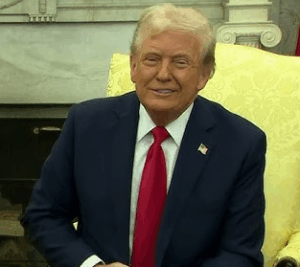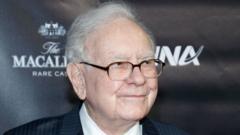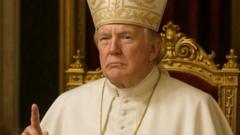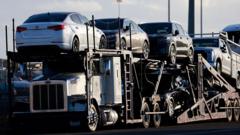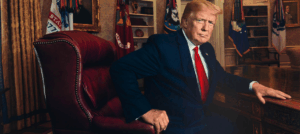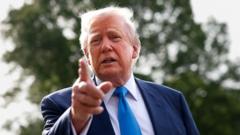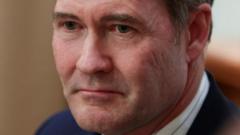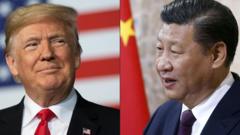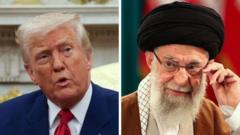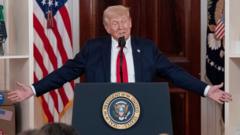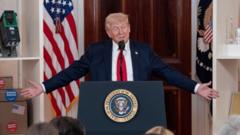The article explores the dynamics and implications of Trump's newly reinvigorated presidency, highlighting his rapid-fire executive actions and reassertion of authority.
Trump 2.0: A Bold New Chapter in American Politics
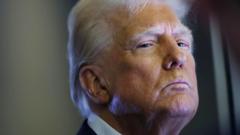
Trump 2.0: A Bold New Chapter in American Politics
In a whirlwind return to the White House, President Trump adopts a confident and aggressive approach, marking a stark contrast to his first term.
Trump's return to the White House has landed with a hefty dose of confidence and assertiveness that has created ripples across the political landscape.
As Air Force One flew from Las Vegas to Miami Saturday evening, President Donald Trump took an informal approach and engaged in a chat with reporters, clearly reveling in his newfound authority since assuming office.
Onboard, Trump displayed his trademark bravado, praising the accomplishments of his administration. "We're getting A-pluses on the work done – and the amount of work done," he declared, emphasizing that many observers considered his initial week presidential success unmatched in history.
This 20-minute conversation also offered startling insights into Trump's strategic decisions, such as a late-night purge of independent government watchdogs, aspirations of acquiring Greenland, calls for increased Palestinian resettlement in neighboring Egypt and Jordan, and reaffirmations of a purportedly "very good relationship" with UK Prime Minister Sir Keir Starmer.
In contrast to Joe Biden's typically reserved press interactions, Trump's impromptu inquiries signify a shift back to a more informal presidential culture.
Evidence of this newfound assertiveness is clear; his Oval Office now showcases presidential artifacts like the iconic Diet Coke button and a bust of Winston Churchill, alongside a stack of leather-bound executive orders that highlight his decisive actions since returning to power.
Unlike past experiences, where Trump appeared momentarily awed in Obama's shadow, he is now comfortably entrenched in authority, energized by a substantial election victory and an unwavering Republican majority in Congress.
Within his initial day in office, Trump reiterated his intent to alter the political landscape with a record-setting 26 executive orders, nearly tripling Biden's first-day output. Historical context reveals that rather than fostering unity after a contentious election, Trump’s aggressiveness served as an affront to the opposition.
Presidential historian Douglas Brinkley likens Trump’s tactic of renaming the Gulf of Mexico to past bold moves made by FDR. This reflects a newly confident leadership style that Trump embodies since his re-election.
The administration's current operational strategies starkly contrast with the previous iteration, underlining a readiness born from past experiences. Former officials note Trump’s team is distinctly more organized and purposeful this time around.
Critics recall the early chaos of his first term, coined by crowd-size controversies and poorly executed travel bans, signaling a lesson learned for the current administration.
As Trump strives for durable policy influence, it appears he is determined to implement sweeping reforms — particularly on immigration — before any potential legal challenges arise.
Though the future may hold uncertainties regarding court interpretations of his executive initiatives, the message is evident: "move fast and break things" is now the mantra for this new presidential chapter, with implications that reach far beyond the boundaries of Washington.
As Air Force One flew from Las Vegas to Miami Saturday evening, President Donald Trump took an informal approach and engaged in a chat with reporters, clearly reveling in his newfound authority since assuming office.
Onboard, Trump displayed his trademark bravado, praising the accomplishments of his administration. "We're getting A-pluses on the work done – and the amount of work done," he declared, emphasizing that many observers considered his initial week presidential success unmatched in history.
This 20-minute conversation also offered startling insights into Trump's strategic decisions, such as a late-night purge of independent government watchdogs, aspirations of acquiring Greenland, calls for increased Palestinian resettlement in neighboring Egypt and Jordan, and reaffirmations of a purportedly "very good relationship" with UK Prime Minister Sir Keir Starmer.
In contrast to Joe Biden's typically reserved press interactions, Trump's impromptu inquiries signify a shift back to a more informal presidential culture.
Evidence of this newfound assertiveness is clear; his Oval Office now showcases presidential artifacts like the iconic Diet Coke button and a bust of Winston Churchill, alongside a stack of leather-bound executive orders that highlight his decisive actions since returning to power.
Unlike past experiences, where Trump appeared momentarily awed in Obama's shadow, he is now comfortably entrenched in authority, energized by a substantial election victory and an unwavering Republican majority in Congress.
Within his initial day in office, Trump reiterated his intent to alter the political landscape with a record-setting 26 executive orders, nearly tripling Biden's first-day output. Historical context reveals that rather than fostering unity after a contentious election, Trump’s aggressiveness served as an affront to the opposition.
Presidential historian Douglas Brinkley likens Trump’s tactic of renaming the Gulf of Mexico to past bold moves made by FDR. This reflects a newly confident leadership style that Trump embodies since his re-election.
The administration's current operational strategies starkly contrast with the previous iteration, underlining a readiness born from past experiences. Former officials note Trump’s team is distinctly more organized and purposeful this time around.
Critics recall the early chaos of his first term, coined by crowd-size controversies and poorly executed travel bans, signaling a lesson learned for the current administration.
As Trump strives for durable policy influence, it appears he is determined to implement sweeping reforms — particularly on immigration — before any potential legal challenges arise.
Though the future may hold uncertainties regarding court interpretations of his executive initiatives, the message is evident: "move fast and break things" is now the mantra for this new presidential chapter, with implications that reach far beyond the boundaries of Washington.

